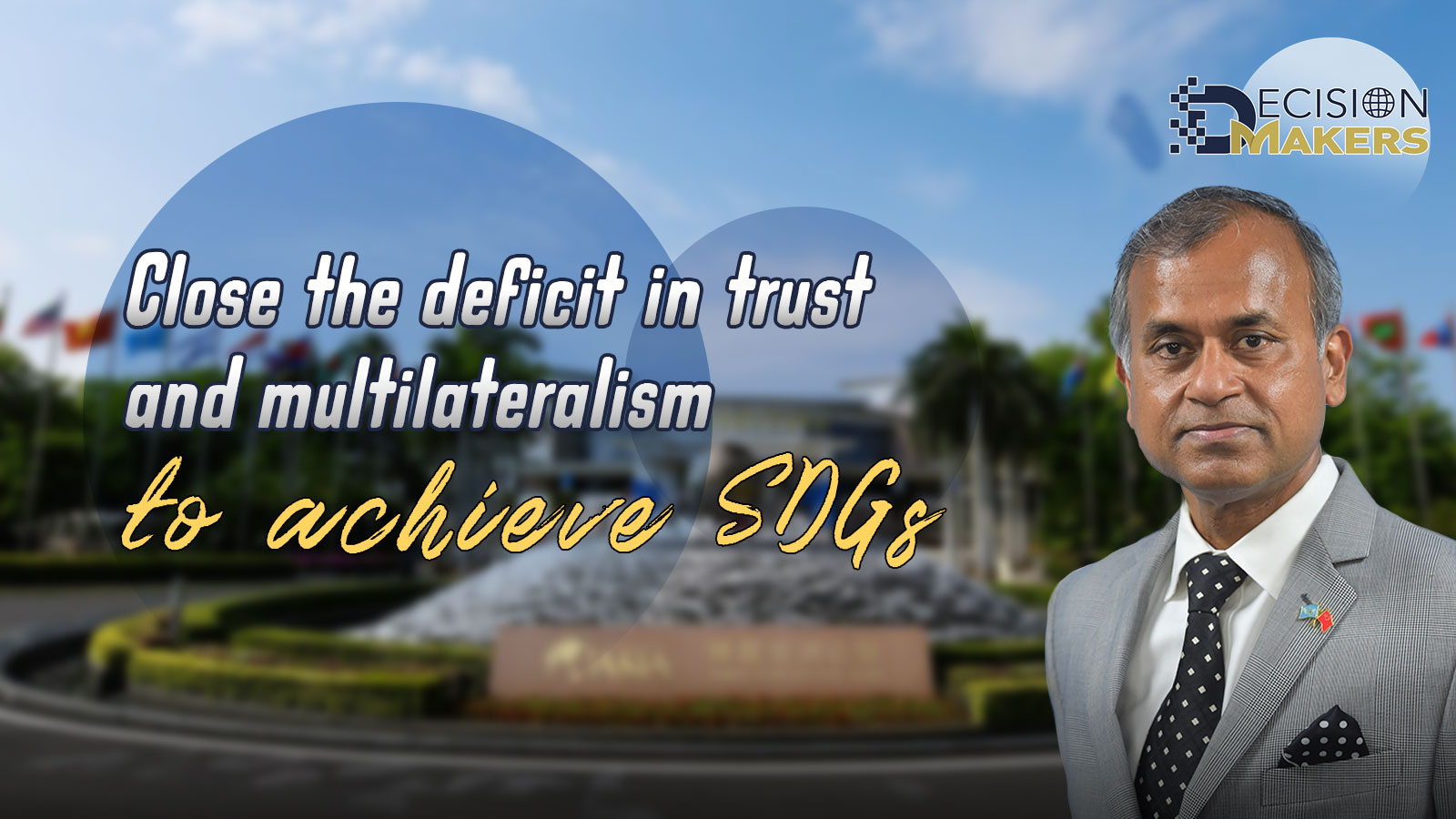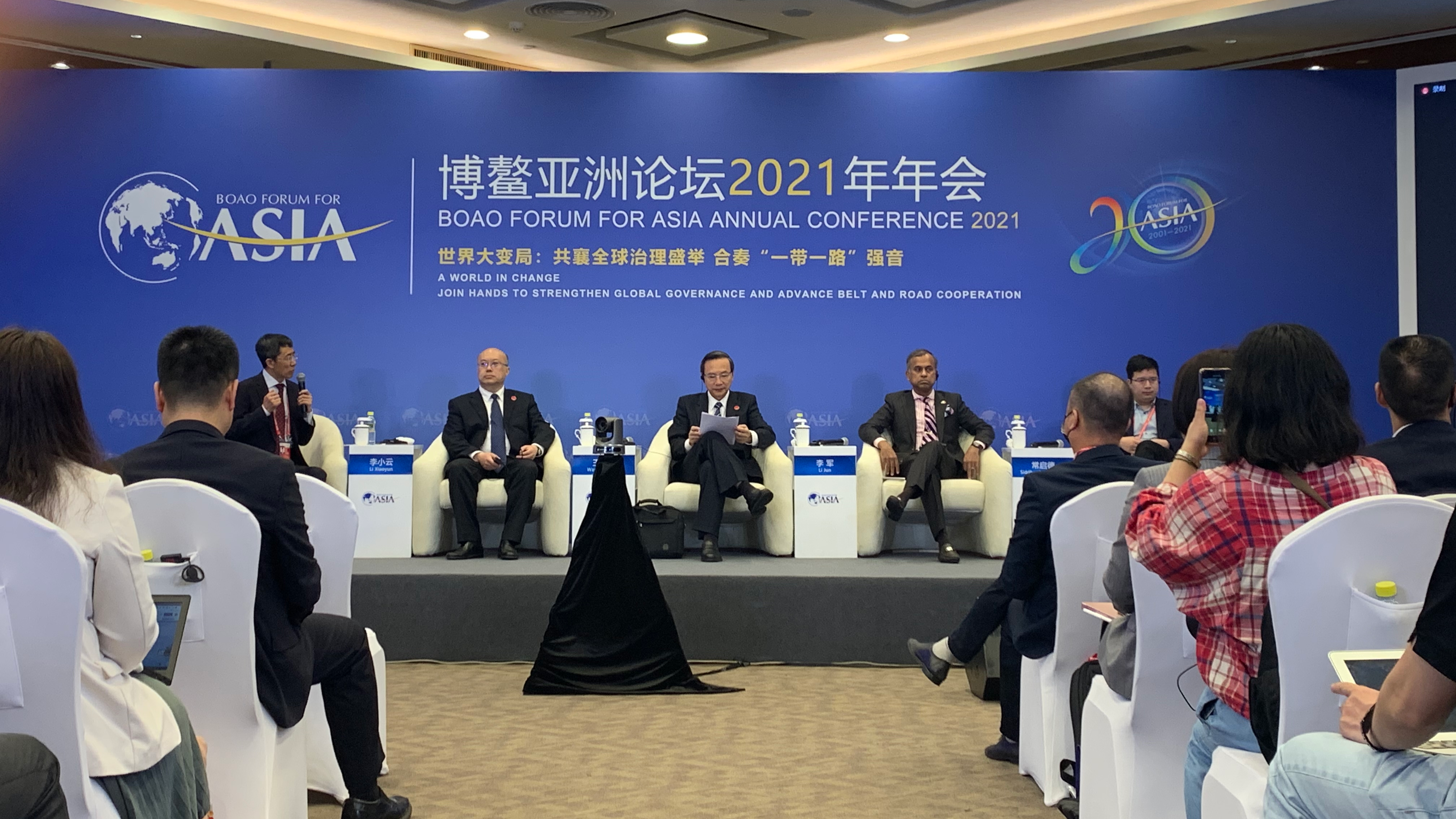
Editor's note: Decision Makers is a global platform for decision makers to share their insights on events shaping today's world. Siddharth Chatterjee is Resident Coordinator of the United Nations in China. The article reflects the author's opinions and not necessarily the views of CGTN.
In the week that passed, over 4,000 attendees visited the island province of Hainan to join the Boao Forum for Asia Annual Conference for 2021, under the theme "A World in Change: Join Hands to Strengthen Global Governance and Advance Belt and Road Cooperation."
Founded 20 years ago, the Boao Forum for Asia has grown into a pivotal space for policymakers and thought leaders from government, business, and academia to converge and connect their vision for the future.
It has indeed earned its title as the "Davos of Asia."
In the last four decades, we have marveled at the meteoric rise of China, experiencing average GDP growth of 10 percent a year and raising some 800 million people out of poverty since reform and opening-up.
In 1988, the architect of these reforms and Chinese leader Deng Xiaoping warned that a genuine Asian century could not come without the rise of other developing countries, a truth that holds today.
The Asian Century is not predetermined, and our recovery from the COVID-19 pandemic cannot be taken for granted unless humanity works together.
Such a gathering in person at Boao would not have been possible but for the disciplined and resilient public health response displayed by China in response to the COVID-19 pandemic.
COVID-19 has exposed the deep fragilities and inequalities of health systems worldwide.
Infrastructure spending is now under threat, with governments and financial institutions unable to unlock financing available before the pandemic.
And while the COVID-19 pandemic has accelerated trends towards remote work and online education, such necessities only widen the digital divide for digital have-nots.
These are the four development deficits highlighted at Boao as per the Sustainable Development: Asia and the World Annual Report 2021 – health, infrastructure, green and digital deficits.
But the most significant barrier in confronting these deficits is a deficit in trust and a deficit in multilateralism.
The 17 Sustainable Development Goals (SDGs), adopted by all UN member states in 2015, remain our shared blueprint for the recovery, survival and flourishing of all humanity.
But even before the COVID-19 pandemic, the world was not on track.
We now witness progress rolling backwards for the first time in decades, for example, on SDG 1 with an estimated additional 88 to 115 million people pushed into extreme poverty, rising to as many as 150 million by the end of 2021 as per the World Bank. The COVID 19 pandemic is having a devastating impact on women and girls globally putting a halt to progress toward gender equality and, instead, exacerbated existing gender inequalities across domains – from gendered divisions of labor to economic stability.

The interconnected, complex challenges presented by the SDGs and our development deficits will require us to revitalize global governance and illuminate new paths for potential cooperation.
The Government of China is advancing rural revitalization as part of the 14th Five-Year Plan, an aspiration in deep alignment with the SDGs vision of leaving no one behind.
If implemented in full, the Belt and Road Initiative not only has the potential to lift 7.6 million people from extreme poverty and 32 million from moderate poverty and can be made a green BRI that provides recipient countries with a sustainable path to prosperity.
As the UN Secretary-General António Guterres said "humanity is 'waging war' on nature," with the planet in a climate emergency and pollution-related disease killing some nine million people annually, as highlighted in UNEP's Making Peace with Nature report.
The China-U.S. Joint Statement on Addressing the Climate Crisis gives us a ray of hope for the two sides to cooperate and share knowledge, experiences, and technologies for a low-carbon future.
By 2050, Africa's population will grow to 2.5 billion people, and two in five children in the world will be born there.
Economic progress is mutually reinforcing, and raising the standard of living for the most vulnerable in Africa will be the key to the longevity and success of Asia and the world.
With less than ten years to achieve the SDGs in the Decade of Action, we must join hands in a renaissance of multilateralism and act in determined political will, bold public policy, and new partnerships in deep alignment with the 2030 Agenda.
The UN in China stands ready to support the Government of China as it enacts rural revitalization, achieves ambitions like China's pledge to reach carbon neutrality by 2060 and shares its development lessons with a world striving to achieve the SDGs.
We also eagerly await the upcoming Food Systems Summit, the COP26 UN Climate Change Conference in Glasgow and the COP15 UN Biodiversity Conference in Kunming as opportunities to renew multilateralism to confront these global challenges.
In his opening remarks at the Boao Forum, President Xi Jinping said, "By setting sail together, we could ride the wind, break the waves, and brave the journey of ten thousand miles."
Only in this new spirit of international cooperation will we achieve the SDGs for everyone, everywhere. This will be possible when we can overcome the deficit in trust and multilateralism.
Let a rising tide lift all boats so that the Asian Century can be a Global Century.
(If you want to contribute and have specific expertise, please contact us at opinions@cgtn.com.)

